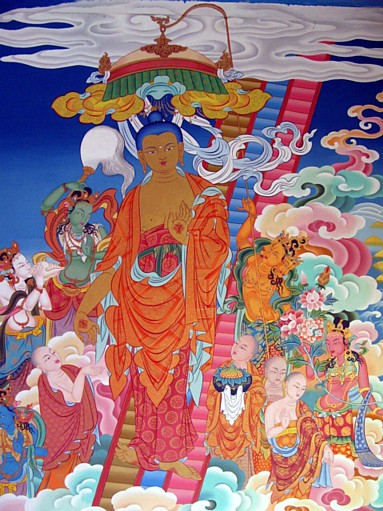Lha Bab Düchen: Difference between revisions
mNo edit summary |
mNo edit summary |
||
| Line 5: | Line 5: | ||
*{{LH|topics/buddha-prayers/|''Buddha Śākyamuni Prayers & Practices'' on Lotsawa House}} | *{{LH|topics/buddha-prayers/|''Buddha Śākyamuni Prayers & Practices'' on Lotsawa House}} | ||
[[Category: | [[Category:Tibetan Terms]] | ||
[[Category:Anniversaries]] | [[Category:Anniversaries]] | ||
[[Category:Tibetan Calendar]] | [[Category:Tibetan Calendar]] | ||
Revision as of 18:15, 20 August 2017

Lha Bab Düchen (Wyl. lha babs dus chen), the 'Festival of the Descent from Heaven' — one of the four major Buddhist holidays. It occurs on the 22nd day of the ninth Tibetan month. Buddha’s mother Mayadevi was reborn in Indra’s heaven. To repay her kindness and to liberate her, and also to benefit the gods, Buddha spent three months teachings in the realm of the gods. When he was about to return to this world, Indra and Brahma manifested three stairs of 80,000 yojanas each reaching this world in Sankisa. As the Buddha walked down the central one, they accompanied him to his left and right carrying umbrellas to honour him. He descended to earth in Sankisa, which is located in modern Uttar Pradesh, and which is counted among the eight holy places.